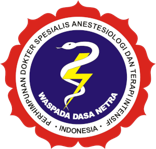SEIZURE CONTROL IN PATIENTS WITH ANTI-NMDAR ENCEPHALITIS : CASE SERIES
Abstract
Background: Anti N-methyl-D-aspartate Receptor (anti-NMDAR) encephalitis is a rare, yet has had increasing number of cases. Patients often require airway protection, mechanical ventilation and intensive care because the patients’ complex symptoms accompanied by seizures that are difficult to control. Here, we present two related case reports that discuss intensive care management and focus on the administered sedation/anesthesia methods and their outcomes.
Case illustration: Male patients, 19 and 21 years old, presented with neuropsychiatric symptoms, seizures, dyskinesia. Both require airway protection and mechanical ventilation as well as Intensive Care Unit (ICU) care. Radiodiagnostic head Computed Tomography (CT) scan and head Magnetic Resonance Imagng (MRI) showed no cerebral abnormalities. Cerebrospinal Fluid (CSF) examination showed positive NMDAR antibodies. First patient had failed to improve clinically even with multiple anti-convulsants, ketamine, dexmedetomidine, immunotherapy, and chemotherapy. Second patient clinically improved with benzodiazepine (midazolam) and propofol as anti-convulsants followed by plasma exchange immunotherapy. The two cases had different outcomes. The first case deceased from septic shock, while the second case was treated by outpatient procedure.
Conclusion : Our presented cases suggest that midazolam, propofol, dextemedetomidine, ketamine do not provide satisfying results for seizure control in patients with anti-NMDAR encephalitis, unless immunotherapy is carried out as early as possible and optimally.
Keywords
Full Text:
PDFReferences
- Dalmau J, Armangué T, Planagumà J, Radosevic M, Mannara F, Leypoldt F, et al. An update on anti-NMDA receptor encephalitis for neurologists and psychiatrists: mechanisms and models. The Lancet Neurology. 2019 Nov;18(11):1045–57.
- Al Ghamdi F, Uffman J, Kim S, Nafiu O, Tobias J. Anesthetic care for patients with anti-NMDA receptor encephalitis. Saudi J Anaesth. 2020;14(2):164.
- Lin KL, Lin JJ. Neurocritical care for Anti-NMDA receptor encephalitis. Biomedical Journal. 2020 Jun;43(3):251–8.
- Samanta D, Garrity L, Arya R. Refractory and Super-refractory Status Epilepticus. Indian Pediatr. 2020 Mar;57(3):239–53.
- Yamanaka D, Kawano T, Tateiwa H, Iwata H, Locatelli FM, Yokoyama M. Successful management of dexmedetomidine for postoperative intensive care sedation in a patient with anti-NMDA receptor encephalitis: a case report and animal experiment. SpringerPlus. 2016 Dec;5(1):1380.
- Haththotuwa HR, Malhas L, Jagadeeswaran A. Anti-NMDA Receptor Encephalitis: An Intensive Care Perspective. Journal of the Intensive Care Society. 2012 Apr 1;13(2):147–50.
- Abboud H, Probasco JC, Irani S, Ances B, Benavides DR, Bradshaw M, et al. Autoimmune encephalitis: proposed best practice recommendations for diagnosis and acute management. J Neurol Neurosurg Psychiatry. 2021 Jul;92(7):757–68.
- de Montmollin E, Demeret S, Brulé N, Conrad M, Dailler F, Lerolle N, et al. Anti– N -Methyl- d -Aspartate Receptor Encephalitis in Adult Patients Requiring Intensive Care. Am J Respir Crit Care Med. 2017 Feb 15;195(4):491–9.
- Balu R, McCracken L, Lancaster E, Graus F, Dalmau J, Titulaer MJ. A score that predicts 1-year functional status in patients with anti-NMDA receptor encephalitis. Neurology. 2019 Jan 15;92(3):e244–52.
Refbacks
- There are currently no refbacks.








